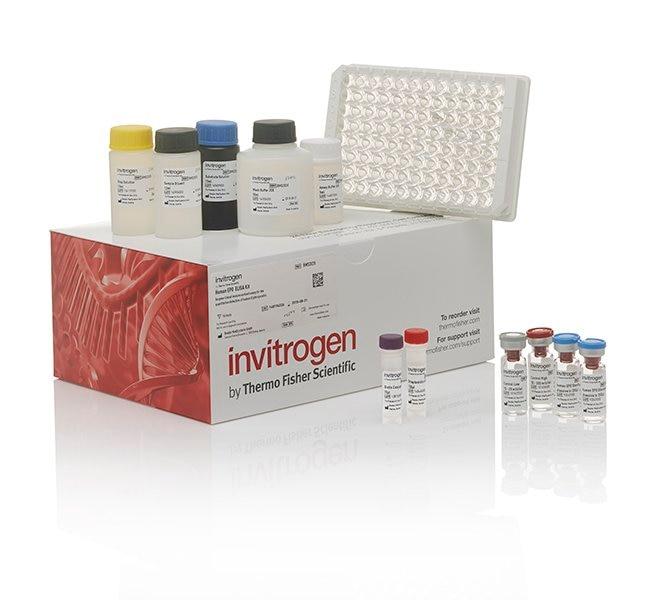Search
Invitrogen
Human Prostaglandin E2 Competitive ELISA Kit
{{$productOrderCtrl.translations['antibody.pdp.commerceCard.promotion.promotions']}}
{{$productOrderCtrl.translations['antibody.pdp.commerceCard.promotion.viewpromo']}}
{{$productOrderCtrl.translations['antibody.pdp.commerceCard.promotion.promocode']}}: {{promo.promoCode}} {{promo.promoTitle}} {{promo.promoDescription}}. {{$productOrderCtrl.translations['antibody.pdp.commerceCard.promotion.learnmore']}}
Product Specifications
Analytical sensitivity
Assay range
Sample type/volume
Hands-on time
Time-to-result
Homogenous (no wash)
Interassay CV
Intraassay CV
Instrument
Product size
Contents
Standard
Assay Diluent
Detection Antibody
AP Conjugate
Wash Buffer
Chromogen
Stop Solution
Adhesive Plate Covers
Shipping conditions
Storage
Protein name
Protein family
Species (tested)
Assay kit format
Detector antibody conjugate
Label or dye
About This Kit
The Human Prostaglandin E2 (Hu PGE2) ELISA quantitates Hu PGE2 in human serum, whole blood, saliva, urine or cell culture medium. The assay will exclusively recognize both natural and recombinant Hu PGE2.
Principle of the method
The Human PGE2 solid-phase sandwich ELISA (enzyme-linked immunosorbent assay) is designed to measure the amount of the target bound between a matched antibody pair. A target-specific antibody has been pre-coated in the wells of the supplied microplate. Samples, standards, or controls are then added into these wells and bind to the immobilized (capture) antibody. The sandwich is formed by the addition of the second (detector) antibody, a substrate solution is added that reacts with the enzyme-antibody-target complex to produce measurable signal. The intensity of this signal is inversely proportional to the concentration of target present in the original specimen.
Rigorous validation
Each manufactured lot of this ELISA kit is quality tested for criteria such as sensitivity, specificity, precision, and lot-to-lot consistency. See manual for more information on validation.
Prostaglandin E2 (PGE2) is a lipid mediator derived from arachidonic acid through the actions of cyclooxygenase (COX) enzymes and terminal prostaglandin E synthases (PGES). It plays a significant role in mediating inflammation, pain sensation, and fever by acting on four receptor subtypes: EP1, EP2, EP3, and EP4. PGE2's involvement in inflammatory responses is well-documented, particularly in diseases such as rheumatoid arthritis and osteoarthritis. Various medications, including nonsteroidal anti-inflammatory drugs (NSAIDs) and selective COX-2 inhibitors, are used to reduce PGE2 production, thereby alleviating inflammation and pain. However, these drugs can have side effects, such as gastrointestinal issues and increased risk of thrombosis. Additionally, PGE2 has a critical role in immune regulation, affecting T cell function and, by extension, the adaptive immune response. It also has a significant impact on skeletal disorders and pain through mechanisms that are still being explored.
For Research Use Only. Not for use in diagnostic procedures. Not for resale without express authorization.
Bioinformatics
Protein Aliases : C20H32O5, PGE2, Prostaglandin E2

Performance Guarantee
If an Invitrogen™ immunoassay doesn't perform as described on our website or datasheet,we'll replace the product at no cost to you, or provide you with a credit for a future purchase.*
Learn more
We're here to help
Get expert recommendations for common problems or connect directly with an on staff expert for technical assistance related to applications, equipment and general product use.
Contact tech support

